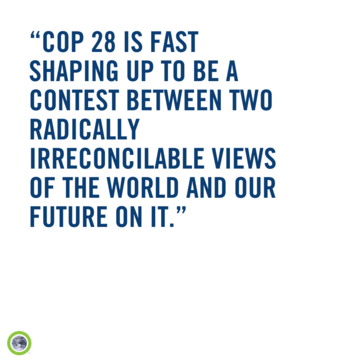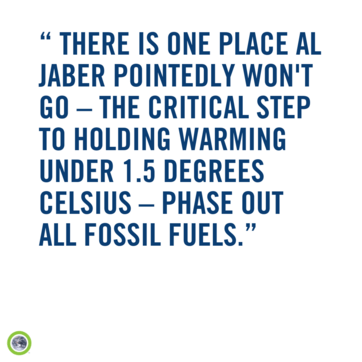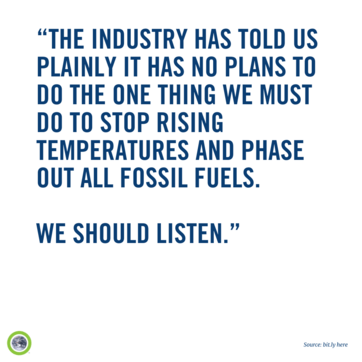
How to Think about COP 28
7 min read
It's shaping up to be a great year for the fossil fuel industry.
US oil production has smashed all previous records. Majors like Exxon and Chevron posted record first quarter profits. And when the International Energy Agency briefly seized the headlines projecting demand for oil, coal, and gas would peak by 2030, the Organization of the Petroleum Exporting Countries (OPEC) quickly fired back, "It is an extremely risky and impractical narrative to dismiss fossil fuels, or to suggest that they are at the beginning of their end."
Now, with the UN's COP 28 climate summit in Dubai approaching, the industry is targeting perhaps its greatest coup yet: Setting the course – and limits – of the global response to the climate crisis.
Take Action: Tell G20 Leaders to End the Fossil Fuel Handouts
There is no mystery as to why. A year virtually certain to be the hottest on record – complete with lethal heatwaves, catastrophic floods, and unreal wildfires hitting simultaneously worldwide – has brought home for millions the truth of climate as an existential threat to humanity.
Yet the single most effective step world leaders at COP 28 could take – reaching a global agreement to phase out all fossil fuels as fast and fairly as possible – poses an existential threat to the industry itself.

But if the industry knows how to do anything well after decades of undermining climate policy, it's how to sell a narrative that bends reality towards its bottom line. And so, with just weeks to go, COP 28 is fast shaping up to be a contest between two radically irreconcilable views of the world and our future on it.
This is more than an argument over adjectives or a place where we just need to put aside our differences and find compromise. With the science clear that our window to keep rapidly rising temperatures within something like livable limits is closing quickly, the stakes of this contest – and the choices that follow – could not be higher.
From Home Field Advantage to Stacking the Starting Lineup
The industry has reason to be optimistic. With the United Arab Emirates – an OPEC member and the world's seventh-largest oil producer – hosting, the industry gets COP 28 on home turf. Plus, with the executive tasked with leading talks – Dr. Sultan Al Jaber – balancing the COP presidency with his day job as CEO of the UAE's national oil company, it also gets control of the agenda.
How has that translated so far? At previous COPs, the industry has sent hundreds of lobbyists. Now at COP 28, oil producers will officially have a seat at the table in negotiations. (Heck, they even get their own pavilion).

Why? As COP 28 director-general Majid al-Suwaidi told Axios, "We're asking them to come and say what they're going to do to address the climate challenge."
But as anyone watching oil majors in action in 2023 can attest, they've already told us. In recent weeks, majors like Exxon and Chevron have both announced major acquisitions of rival firms significantly increasing their reserves – and are looking for more. The oil company Al Jaber leads, ADNOC, last year announced plans to boost production. BP recently walked back its climate commitments for 2030. OPEC is telling the world we need more oil, not less.
The list goes on. A five-year old could see that this is not what you do if you're serious about transitioning your business from the primary cause of climate change to something like a solution. And for good reason: They're not.
The Greatest Showman?
The industry has another not at all secret weapon in the fight to control the narrative about climate action and energy transition: COP President Al Jaber.
As outlets like Politico and the Intercept have covered, the UAE has spent millions on blue chip public relations firms to build up its image as the face of a new and forward-thinking petrostate, with its own renewable energy company, Masdar, and the development of Masdar City, supposedly the sustainable city of the future. Having led both Masdar and Masdar City prior to stepping into his current role leading UAE's national oil company, Al Jaber has become the face and spokesperson of this effort, selling a vision of an oil state committed to transforming its business and reducing emissions for the good of the planet.

And yet, as reporting has shown, the achievements of these posts may have been oversold, with renewables only providing 2% of UAE's energy mix and investment in Masdar City tailing off. Nonetheless, the UAE has leveraged these credentials to position Al Jaber as a trustworthy leader on climate action, able to see both sides of the fossil fuel–climate divide and work for solutions that work for both.
To his credit, Al Jaber repeatedly uses his platform to argue for aggressive action on climate, telling audiences at an Atlantic Council event in January:
"We are way off track. The world is playing catch-up when it comes to the key Paris goal of holding global temperatures down to 1.5 degrees, and the hard reality is that in order to achieve this goal global emissions must fall 43 percent by 2030. To add to that challenge, we must decrease emissions at a time of continued economic uncertainty, heightened geopolitical tensions, and increasing pressure on energy security."
In addition, some of the target outcomes he's identified for COP 28 are critical goals we support, including tripling renewable energy capacity, doubling energy efficiency and bringing methane emissions from fossil operations to near zero by 2030. He calls for the wealthy nations responsible for the majority of global emissions to step and deliver the critical climate finance developing nations need to survive climate disasters and build economies ready for a warming world. Also 100% true.
All of which combine to give the UAE position – and by extension, much of the fossil fuel industry – the veneer of credibility and commitment. After all, there's no more effective way to sell a position than to mix in a little bit of the truth with a little bit of something else.
Reducing Omissions
For all the talk about "attacking emissions" and increasing ambition (again, both great on paper), there is one place Al Jaber pointedly won't go - the critical step to holding warming to the 1.5 degrees Celsius: Phase out all fossil fuels. And as fast and fairly as possible.
This is also exactly the demand omitted from the UAE and Al Jaber's letter outlining their scope and ambitions for COP 28. Yes, the letter sets a target of an "energy system free of unabated fossil fuels by mid-century," but the inclusion of "unabated" is the sign we're being sold something and gets at the heart of the industry sales pitch.
If you don't spend your life in policy papers, "unabated fossil fuels" translates into coal, oil, and gas burned without technologies to capture and store the associated global warming emissions. The industry loves the technology involved – carbon capture and storage (CCS) and carbon capture, utilization, and storage (CCUS) – because it promises the potential to keep burning its products forever.

But there is as yet no meaningful consensus on the bounds and definition of "unabated" (for example, what percentage of emissions are captured?) and in practice, there no currently operational projects that have delivered on the marketing hype. Even the sober International Energy Agency notes that "The history of CCUS has largely been one of underperformance."
Which is to say, there is one thing we have to do to stop global warming and that's end the era of fossil fuels. We have the technology to do it and renewable alternatives are increasingly cheaper worldwide.
Of course, that's the last thing the fossil fuel industry wants to do. What it's selling is the magical thinking version of reality where as-yet unproven technology and wiggly terms like "unabated" can somehow stop rising temperatures while allowing them to keep burning their products forever.
Much like the mafia, the industry has the luxury and habit of speaking plainly about its views. And its view – to hear one CEO at a recent conference tell it – is that the challenge of climate change is not about shifting its business model but shifting public perceptions:
“I don’t see where we are today as something that is going to end our industry . . .“In mitigating climate change, there is also the opportunity to continue to produce oil for our energy security. So, we’re trying to work that strategy and I think it is going to work well. The biggest challenge that is harder to address than even the innovation around technology is just getting people to trust our industry again and to understand what the data really says.”
There's just one problem. What the data really says is that continuing to burn fossil fuels will take global warming way past livable limits and invite a future of climate catastrophe and unprecedented suffering. No magical thinking or marketing pitch will change that. The industry has told us plainly it has no plans to do the one thing we must do to stop rising temperatures and phase out all fossil fuels.
We should listen.
Reality versus Magical Thinking
We are being sold a fairy tale of a future where burning fossil fuels forever will somehow not unleash climate devastation. COP 28 promises to be the biggest pitch yet. We still have the choice of whether to buy it.
Phasing out all fossil fuels is the first step toward true net zero and building a truly equitable and sustainable future for the planet. But it's not the only one. That's why we're fighting for an agreement at COP 28 that works for progress on three fronts.
1. Reduce Emissions
- Phase out all fossil fuels and fossil fuel subsidies.
- Triple global renewable energy capacity by 2030.
- Double energy efficiency by 2030.
- Fossil fuel methane emissions at near zero by 2030.
2. Increase climate finance substantially
- Deliver on prior commitments too.
- Full funding for Global South countries to create thriving clean energy economies and address climate impacts.
3. Reform future COP processes
- Ensure fossil fuel interests can't block progress on Paris Agreement goals.
We are also pragmatists. With negotiations led by an oil CEO, we may not get phaseout on the agenda or ultimately, in a decision text. In which case, we'll continue to fight at COP 29 and beyond. We'll need to reform the COP process itself so fossil fuel interests can no longer block progress for all of us.
But phasing out all fossil fuels has to be the goal. It's how we survive. The tools are in our hands. It's just that simple.




